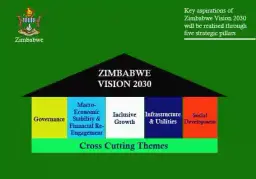Zimbabwe’s Vision 2030 is a development plan that aims to transform the country into an upper-middle-income economy by 2030. The vision focuses on economic transformation, infrastructure development, social development, good governance, and environmental sustainability. It seeks to achieve sustained economic growth, diversify key sectors, create jobs, and reduce poverty. Infrastructure development is crucial to support economic activities and improve citizens’ quality of life. The vision emphasizes access to quality education, healthcare, housing, and social services. Good governance, accountability, and the fight against corruption are central to the vision. Environmental sustainability and climate resilience are also key priorities.
The CGI president Jonathan Dube said the World Bank defined a lower middle-income economy as one with a Gross National Income (GNI) per capita of between US$1 036 and US$4 045 while an upper middle-income economy is one with a GNI of between US$4 046 and US$12 535. Dube also said there was a need to ascertain where the country was at present and what the matrices were to measure an upper-middle-income economy. NewsDay quotes Dube as saying:
Are we even a lower middle-income economy? Who will be there in 2030? The decisions are based on us. Will we be there? We need to know who to address and how to address them? Who will be the stakeholders in 2030? The notion of an upper-middle-income economy for Zimbabweans was rather like heaven. Nobody had been there.
The Corporate Governance Unit’s permanent secretary in the Office of the President and Cabinet, Allen Choruma stressed the importance of collaboration and a unified approach to achieve the vision. Choruma said:
We are a long way from where we need to be to reach an upper-middle-income economy. It is possible but only if we work together. It’s not a government issue. We don’t need an ‘us and them’ attitude. We all need to work together. It’s a Zimbabwean issue. It will affect all our children.
Bishop Never Muparutsa suggested bringing the vision date to 2025 and emphasized the link between ethical leadership and the attainment of Vision 2030. He said:
For some of you, 2030 is too late. Let’s zoom in on 2030 and make it 2025. Let’s be ethical now. We have lost leadership driven by self-discipline but if we get our act together we will teach this generation to transform our nation.
He also highlighted the negative impact of greed and selfishness on corporate scandals in the country.
Analysts say corruption in Zimbabwe, exemplified by the gold mafia, money laundering, and resource leakage, poses a significant threat to the attainment of Vision 2030. These corrupt practices impede progress, erode trust, and divert resources needed to reach the goals of Vision 2030.
Source Pindula News










